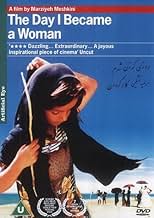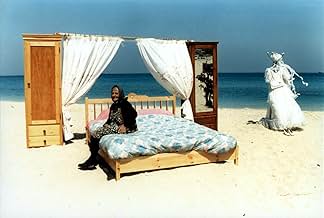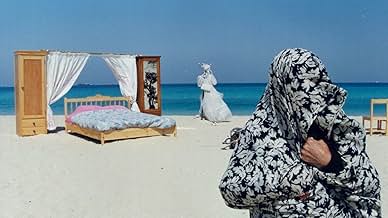IMDb RATING
7.3/10
2.1K
YOUR RATING
Three linked stories show women at life's crossroads: a girl's 9th birthday, a cycling race, and an elderly woman's dream of buying long-desired items.Three linked stories show women at life's crossroads: a girl's 9th birthday, a cycling race, and an elderly woman's dream of buying long-desired items.Three linked stories show women at life's crossroads: a girl's 9th birthday, a cycling race, and an elderly woman's dream of buying long-desired items.
- Director
- Writers
- Stars
- Awards
- 10 wins & 5 nominations total
- Director
- Writers
- All cast & crew
- Production, box office & more at IMDbPro
Featured reviews
I saw "Roozi khe zan shodam" ("The Day I Became a Woman") a few days ago during the Memorial Day holiday. It was a good film with strong, subtle acting and quite interesting camera shots.
In a nutshell, the film is about women in contemporary Iran. It depicts compelling accounts about a girl who has just turned nine and is now therefore considered to be a woman and expected to leave childhood play behind; a woman's bicycle race and the strong objection a husband has to his wife's participation; and an elderly woman who has in earlier life deferred her desires to buy consumer goods and finally has the opportunity to realize her spending dreams.
Without having lived in or even visited Iran, I can't judge the realism of "Roozi khe zan shodam". The camera offers us an innocent, child-like eye, just observing these characters and leaving us to draw our own conclusions. I particularly enjoyed the cinematography of the mass of women cyclists, all clad in black practically head to foot, pedaling away almost entirely in silence except for the rhythmic pedaling noises; and the parallel shots focusing on the legs of the galloping horses, carrying the complaining husband and his cohorts. The pedaling wife Ahoo (Shabnam Tolui) never speaks a word, but her focused and desperate efforts indicate her quest for increased independence. I also enjoyed following the activities of 9-year-old Hava (Fatemeh Cherag Akhar).
I would see "Roozi khe zan shodam" again for its cinematography and the unique (at least for Western audiences) life experiences depicted. It's by no means Hollywood fare or even overtly feminist, but allows the viewer to settle in for a bit of (realistic or stylized?) local color and look at perspectives there of women in three different stages in their lives.
In a nutshell, the film is about women in contemporary Iran. It depicts compelling accounts about a girl who has just turned nine and is now therefore considered to be a woman and expected to leave childhood play behind; a woman's bicycle race and the strong objection a husband has to his wife's participation; and an elderly woman who has in earlier life deferred her desires to buy consumer goods and finally has the opportunity to realize her spending dreams.
Without having lived in or even visited Iran, I can't judge the realism of "Roozi khe zan shodam". The camera offers us an innocent, child-like eye, just observing these characters and leaving us to draw our own conclusions. I particularly enjoyed the cinematography of the mass of women cyclists, all clad in black practically head to foot, pedaling away almost entirely in silence except for the rhythmic pedaling noises; and the parallel shots focusing on the legs of the galloping horses, carrying the complaining husband and his cohorts. The pedaling wife Ahoo (Shabnam Tolui) never speaks a word, but her focused and desperate efforts indicate her quest for increased independence. I also enjoyed following the activities of 9-year-old Hava (Fatemeh Cherag Akhar).
I would see "Roozi khe zan shodam" again for its cinematography and the unique (at least for Western audiences) life experiences depicted. It's by no means Hollywood fare or even overtly feminist, but allows the viewer to settle in for a bit of (realistic or stylized?) local color and look at perspectives there of women in three different stages in their lives.
On the surface this film tells three simple stories, but its simplicity is deceiving. Each story tells an episode in the life of a woman but as the woman ages the stories become more and more surreal. In so doing Marzieh Meshkini is making a parallel with the life of Iranian women.
I had completely forgotten about this movie, until I had a dream about the bicycles and the beach at the end. The more I thought back, the more I wanted to see it again.
I know this film has a very firm political message, but the images are so simple, universal and kinda powerful they linger with you, or at least have with me for years.
Three stories, none of which connect, about woman living in Iran, a young girl who finds out she has has to go to the "all girls" school soon, leaving behind her male friends, a woman bicycles away from her wedding and refuses to pull over, an and elderly woman whose husband is dead who can now do what she has always wanted, create the home of her dreams, with furniture right along the beach; a house without walls.
Effective, original, and poignant. When does one, become a woman(or man), and why? How is it different for each character, how is it the same, and what does is spell out once it's all putt together? ...almost makes me want to learn to ride a bike.
I know this film has a very firm political message, but the images are so simple, universal and kinda powerful they linger with you, or at least have with me for years.
Three stories, none of which connect, about woman living in Iran, a young girl who finds out she has has to go to the "all girls" school soon, leaving behind her male friends, a woman bicycles away from her wedding and refuses to pull over, an and elderly woman whose husband is dead who can now do what she has always wanted, create the home of her dreams, with furniture right along the beach; a house without walls.
Effective, original, and poignant. When does one, become a woman(or man), and why? How is it different for each character, how is it the same, and what does is spell out once it's all putt together? ...almost makes me want to learn to ride a bike.
10strambi
Nothing against the American industry, but if you are looking for a Hollywood type of movie try something else. Yes, there is plenty of beauty and fantasy, but not in the American fashion. Here the stories and people and places are very simple (and very deep). Yet, the fantasy is so real that you can very easily transpose it to your own life, regardless if you came from Middle East, Japan or Americas. Well, as long as you have some brains and some subtlety. After I saw this movie I spent weeks thinking about it,and I learned so much. Every single detail of the story, camera work and sound has a meaning.
I read a magazine review critic complaining the movie was boring, specially the first story, in which the girl (according to that critic review) was a very bad actress, concerned about not playing that day, but not showing emotions for what her life was going to be. Does a nine year old girl understand what is "becoming a woman"? Of course not, her understanding was limited to that moment when she was being forbidden to play with her best friend. This is exactly what made the story so universal, I could remember myself (raised on an environment with freedom for women) waiting for the permissions of my mother, desperately waiting for the time of the adults. And inside the critical context of the movie, her lack of understanding of what her life was going to become was also very important. Inside that real life drama, people take care of their everyday lives, and go on. Oh, and so many other meanings and symbols just in this first story. The wind and water (also present in the other two stories), the plastic fish by which she exchanges her chaddor, her little time passing away and she unable to use it and still waiting, her availability, the lollipop teasing across the bar separating her from her boy friend (the *given* pleasure the only control left to her), her mother coming to pick her up, etc.
The other two stories are as good and universal. Even if you live inside a women's lib society, even if you are a man. This movie is a work of art. So, it demands sensibility for understanding it. If you are looking for fast food entertainment, forget about it.
I read a magazine review critic complaining the movie was boring, specially the first story, in which the girl (according to that critic review) was a very bad actress, concerned about not playing that day, but not showing emotions for what her life was going to be. Does a nine year old girl understand what is "becoming a woman"? Of course not, her understanding was limited to that moment when she was being forbidden to play with her best friend. This is exactly what made the story so universal, I could remember myself (raised on an environment with freedom for women) waiting for the permissions of my mother, desperately waiting for the time of the adults. And inside the critical context of the movie, her lack of understanding of what her life was going to become was also very important. Inside that real life drama, people take care of their everyday lives, and go on. Oh, and so many other meanings and symbols just in this first story. The wind and water (also present in the other two stories), the plastic fish by which she exchanges her chaddor, her little time passing away and she unable to use it and still waiting, her availability, the lollipop teasing across the bar separating her from her boy friend (the *given* pleasure the only control left to her), her mother coming to pick her up, etc.
The other two stories are as good and universal. Even if you live inside a women's lib society, even if you are a man. This movie is a work of art. So, it demands sensibility for understanding it. If you are looking for fast food entertainment, forget about it.
This is a beautifully shot, richly textured film. Its decidedly surrealist elements do not detract from its poignant central message: that the arbitrary social conventions which govern womens' lives in Iran are inherently absurd. What is so striking about this film is the way in which the director brings out this element of absurdity by transplanting an Iranian narrative onto the bizarre setting of Kish Island, a free trade zone and resort off the coast of Iran. The women in the film are all forced to play out the roles assigned for them by Iranian society, despite the virtual absence of the state, which is so often demonized in treatments of Iranian women's lives.
Did you know
- TriviaMarzieh Makhmalbaf's directorial film debut.
- GoofsIn the first sequence, the lollipop that Hava and Hassan pass between them grows and shrinks in size without regard to the passage of time.
- Quotes
Grandmother: Will you promise to be back by noon?
Hava: I promise!
Grandmother: God won't forgive you if you lie. Don't be late.
- ConnectionsFeatured in Women Make Film: A New Road Movie Through Cinema (2018)
Details
- Release date
- Country of origin
- Official sites
- Language
- Also known as
- The Day I Became a Woman
- Filming locations
- Kish Island, Iran(location)
- Production companies
- See more company credits at IMDbPro
Box office
- Budget
- $180,000 (estimated)
- Gross US & Canada
- $149,971
- Opening weekend US & Canada
- $48,255
- Apr 8, 2001
- Gross worldwide
- $149,971
Contribute to this page
Suggest an edit or add missing content







